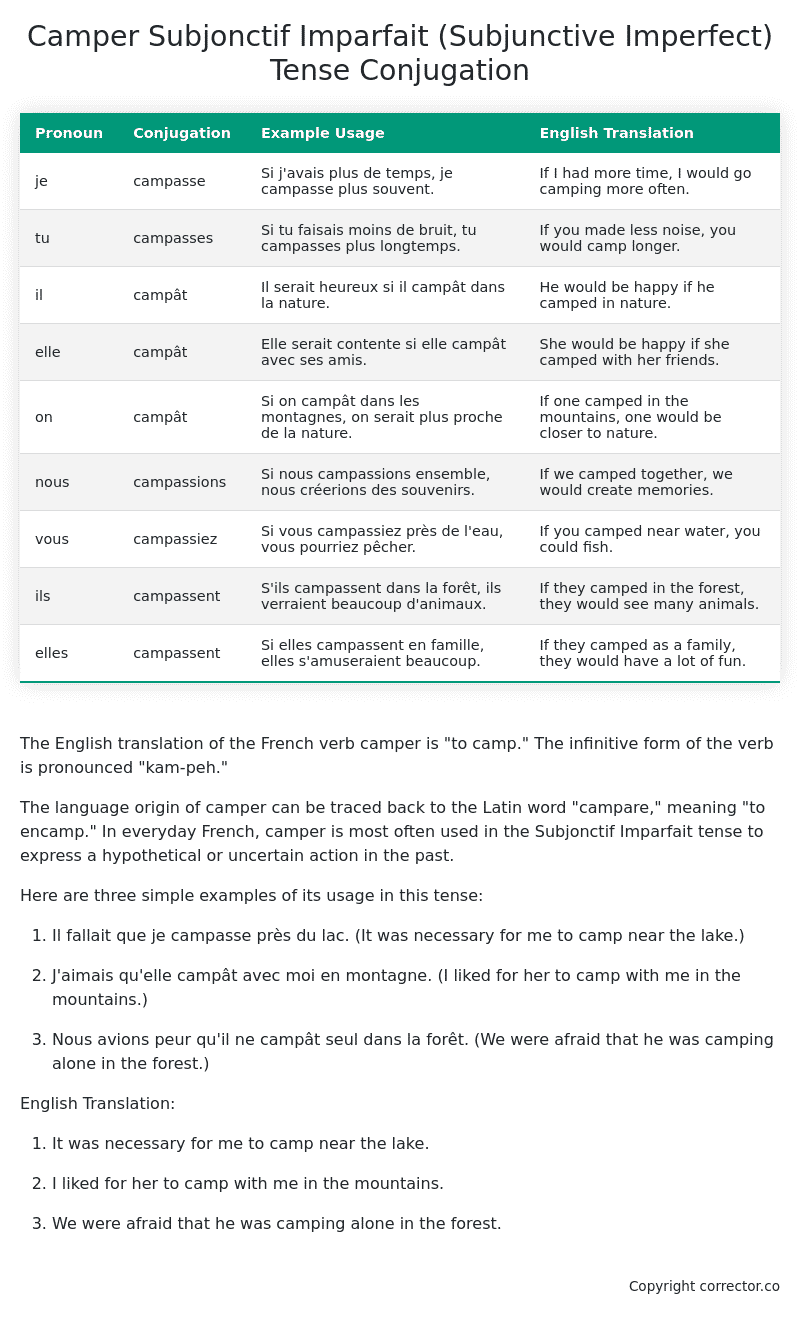Subjonctif Imparfait (Subjunctive Imperfect) Tense Conjugation of the French Verb camper
Introduction to the verb camper
The English translation of the French verb camper is “to camp.” The infinitive form of the verb is pronounced “kam-peh.”
The language origin of camper can be traced back to the Latin word “campare,” meaning “to encamp.” In everyday French, camper is most often used in the Subjonctif Imparfait tense to express a hypothetical or uncertain action in the past.
Here are three simple examples of its usage in this tense:
-
Il fallait que je campasse près du lac. (It was necessary for me to camp near the lake.)
-
J’aimais qu’elle campât avec moi en montagne. (I liked for her to camp with me in the mountains.)
-
Nous avions peur qu’il ne campât seul dans la forêt. (We were afraid that he was camping alone in the forest.)
English Translation:
-
It was necessary for me to camp near the lake.
-
I liked for her to camp with me in the mountains.
-
We were afraid that he was camping alone in the forest.
Table of the Subjonctif Imparfait (Subjunctive Imperfect) Tense Conjugation of camper
| Pronoun | Conjugation | Example Usage | English Translation |
|---|---|---|---|
| je | campasse | Si j’avais plus de temps, je campasse plus souvent. | If I had more time, I would go camping more often. |
| tu | campasses | Si tu faisais moins de bruit, tu campasses plus longtemps. | If you made less noise, you would camp longer. |
| il | campât | Il serait heureux si il campât dans la nature. | He would be happy if he camped in nature. |
| elle | campât | Elle serait contente si elle campât avec ses amis. | She would be happy if she camped with her friends. |
| on | campât | Si on campât dans les montagnes, on serait plus proche de la nature. | If one camped in the mountains, one would be closer to nature. |
| nous | campassions | Si nous campassions ensemble, nous créerions des souvenirs. | If we camped together, we would create memories. |
| vous | campassiez | Si vous campassiez près de l’eau, vous pourriez pêcher. | If you camped near water, you could fish. |
| ils | campassent | S’ils campassent dans la forêt, ils verraient beaucoup d’animaux. | If they camped in the forest, they would see many animals. |
| elles | campassent | Si elles campassent en famille, elles s’amuseraient beaucoup. | If they camped as a family, they would have a lot of fun. |
Other Conjugations for Camper.
Le Present (Present Tense) Conjugation of the French Verb camper
Imparfait (Imperfect) Tense Conjugation of the French Verb camper
Passé Simple (Simple Past) Tense Conjugation of the French Verb camper
Passé Composé (Present Perfect) Tense Conjugation of the French Verb camper
Futur Simple (Simple Future) Tense Conjugation of the French Verb camper
Futur Proche (Near Future) Tense Conjugation of the French Verb camper
Plus-que-parfait (Pluperfect) Tense Conjugation of the French Verb camper
Passé Antérieur (Past Anterior) Tense Conjugation of the French Verb camper
Futur Antérieur (Future Anterior) Tense Conjugation of the French Verb camper
Subjonctif Présent (Subjunctive Present) Tense Conjugation of the French Verb camper
Subjonctif Passé (Subjunctive Past) Tense Conjugation of the French Verb camper
Subjonctif Imparfait (Subjunctive Imperfect) Tense Conjugation of the French Verb camper (this article)
Subjonctif Plus-que-parfait (Subjunctive Pluperfect) Tense Conjugation of the French Verb camper
Conditionnel Présent (Conditional Present) Tense Conjugation of the French Verb camper
Conditionnel Passé (Conditional Past) Tense Conjugation of the French Verb camper
L’impératif Présent (Imperative Present) Tense Conjugation of the French Verb camper
L’infinitif Présent (Infinitive Present) Tense Conjugation of the French Verb camper
Struggling with French verbs or the language in general? Why not use our free French Grammar Checker – no registration required!
Get a FREE Download Study Sheet of this Conjugation 🔥
Simply right click the image below, click “save image” and get your free reference for the camper Subjonctif Imparfait tense conjugation!

Camper – About the French Subjonctif Imparfait (Subjunctive Imperfect) Tense
Formation
Common Everyday Usage Patterns
Interactions with Other Tenses
Subjonctif Présent
Indicatif Passé Composé
Conditional
Conditional Perfect
Summary
I hope you enjoyed this article on the verb camper. Still in a learning mood? Check out another TOTALLY random French verb conjugation!


